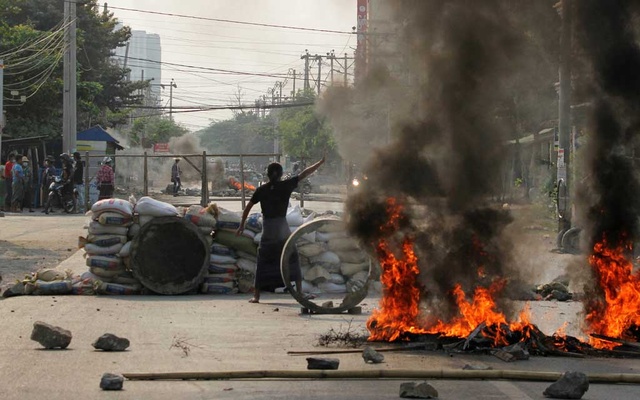
The western state had previously stood out for showing few signs of supporting the anti-coup demonstrations that have been held almost daily across the Southeast Asian country, whose borderlands are home to some two dozen ethnic militias.
The 77 civil society groups, from minorities that included the Rakhine, Chin and Mro among others, urged the army on Sunday to stop the crackdown on protesters that has killed around 250 of them and for those detained to be released.
A joint statement also demanded that the army “abandon the coup and accept the federal democratic system based on self administration that is desired by the people”.
A spokesman for the army did not answer calls requesting comment. Among the goals the junta has set out is to “restore eternal peace” based on an existing ceasefire with some armed factions.
Some of Myanmar’s ethnic armed groups have voiced open opposition to the coup by the army that has been fighting some of them for over seven decades, but others have been more ambiguous.
“Ethnic nationalities could ultimately decide who holds power in Myanmar,” said Khin Ohmar, a longtime democracy activist who lived through a previous failed uprising against the military in 1988.
At that time, the armed groups stayed largely on the sidelines as the army crushed the protests that brought Myanmar’s now detained leader Aung San Suu Kyi and her National League for Democracy (NLD) to prominence.
LITTLE PROGRESS
Both Suu Kyi and the top army command are from Myanmar’s Bamar Buddhist majority and the minorities complained of seeing little advance under her rule, dashing their hopes of improvement during a decade of halting democratic reforms.
Ethnic parties’ gains had been limited under an electoral system that brought the NLD another landslide in a November ballot that the army said was marked by fraud – the justification it used for seizing power.
The army has made efforts to court minority politicians – including with proposals for electoral reforms.
But as opponents of the coup try to set up a parallel civilian administration, they are also trying to rally support from the ethnic groups, with a call for the federal system that they have long sought to give them more autonomy.
Some protesters have also called for the establishment of a multi-ethnic federal army.
A spokesman for the Karen National Union (KNU), fighting near the eastern border with Thailand, said it was cautiously optimistic after its discussions with opponents of the coup.
“We need to build this country through a democratic federal union,” Padoh Taw Nee told Reuters last week.
A quarter of Myanmar’s 53 million population lives in an area where at least one ethnic armed group claims territory.
Armed confrontations have increased since the coup.
The Kachin Independence Army, operating near the northern border with China, has launched several attacks on army and police posts since the coup, local media reported. That followed the killing of protesters demonstrating in major Kachin towns.
The KNU and the Restoration Council of Shan State, also based on the Thai border, have condemned the army takeover and announced their support for public resistance.
The Rakhine-based Arakan Army (AA), however, had not been openly supportive of the protests. It had welcomed its removal by the army from a list of designated terrorist groups as a step to solving the crisis in the state – if not the country.
Conflict in Rakhine had intensified under Suu Kyi – both as an army offensive drove out hundreds of thousands of Rohingya Muslims and then as the AA, which recruits largely from the local Rakhine Buddhist population, stepped up its own fight for autonomy.
The AA had agreed a ceasefire before the coup and fighting in Rakhine had largely died down by the time the army seized power. The AA, which carries a strong influence in the state, did not immediately respond to a request for comment on the call by the civil society groups.
Some Rohingya groups had previously voiced opposition to the coup, as had Rohingya refugees in camps in Bangladesh.
